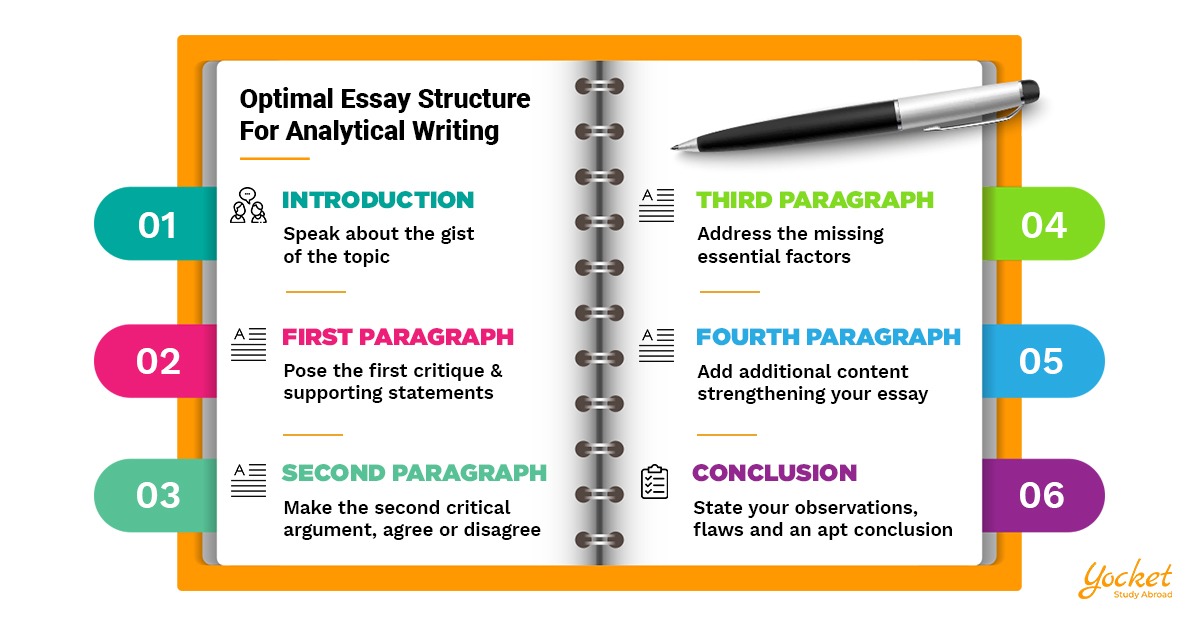GMAT’s Analytical Writing test can be a challenging task. Amidst the ongoing exam pressure, the simple activity of analysing a given argument could be clouded by chaotic thoughts. In order to successfully compose a mind boggling critical essay within 30mins you need to master argumentative essay writing. A simple method to do so is, READ, WRITE and PRACTISE!
News Alert! Analytical Writing Assessment has now been included as an integral part of the GMAT Online.
Analytical Writing Assessment section of GMAT:
The writing task in hand for the GMAT essay expects you to, (i) break down the presented argument and (ii) assess the reasoning of the given argument. Think about the setting of the argument, examine the possibility of execution of the given argument, will help you strengthen your analysis.
Decoding the GMAT AWA section:
Essential nuances of the Analytical Writing task are:
- No. of questions?
Ans: One argumentative piece
- What needs to be done?
Ans: Tailor a critique essay assessing the given arguments
- How much time to work?
Ans: 30 mins to complete the essay
- How is GMAT AWA scored?
Ans: Scored on a 0-6 score scale with a half point interval
The AWA topics for the given passage could be from any subject, be it Business, Politics, Science or World Affairs. But, you don’t need to possess complete knowledge on topics to write the essay. So, No Stress! All you need to know is to write a well-rounded English essay. Along with the ability to critically analyse the presented argument.
An effective structure to ace GMAT essay writing
A good quality essay has structure, crisp to-the-point phrases, maintains a vivid vocabulary and ensures grammatical correctness. As an individual, you might be well-versed in writing. But, to write the AWA essay in the stipulated time can put you in a tough spot. To avoid such lingual mishaps, prepare yourself well in advance. Refer to an effective essay structure and attempt to practice it thoroughly.

Introduction: Introduce the essay, mention the factors, observations, assumptions and flaws stated in the argument. Pose your views which will be discussed further.
First Paragraph: State your first critique of the argument and support your views with an example. Ensure to write your inferences with evidence and reasoning.
Second Paragraph: Progress to your next critical inference of the argument. Agree or disagree with the arguments made and justify.
Third Paragraph: Address the missing content or the essential factors that would have been ignored in the arguments. You can either pose questions or point out the deficiency to indicate the incompleteness.
Fourth Paragraph: Include additional pointers that you think might help strengthen the argument.
Conclusion: State your observations, infer the flaws of the argument and conclude by stating arguments that would have strengthened the piece. Ensure that your conclusion is complete and doesn’t miss out on important observations made through your essay.
You can write a well structured essay by applying the above structure. You could also tailor your own style of essay by adding or subtracting sections you wish to. Practise writing essays for as many GMAT AWA sample topics available online. This will help you polish your writing, organise your thoughts and curate a reader friendly essay.
How to make your Essay standout?
In order to make your GMAT AWA essay standout, you need to be different! Below are some of the effective ways to make your essay standout:
-
Use facts, stats in your essay. However, ensure that the information is accurate.
-
Using quotes might help you polish your inferences.
-
Style your essay writing with questions, exclamatory sentences and a rich vocabulary.
-
Ensure that you have a readable flow to your essay.
-
Improvise and play with your words.
-
Write short quality paragraphs.
-
Use headings and subheadings wherever necessary.
-
You could also add literary references, references from fiction and so on.
-
Make the essay an interesting read.
GMAT Analytical Writing Tips:
An effective way you could create an excellent essay is by following some of the basic rules of language. These rules might be the basics but are the most essential to form a magnificent essay:
-
Start with reading and understanding thoroughly.
-
Plan your essay.
-
Focus on the structure, flow and focus point of the essay.
-
Do not deviate from the topic.
-
Invest time in writing a good introduction and a strong conclusion.
-
Save some time to revise and edit your essay.
-
Time your writing so you’re able to cover everything you want to write.
How is the GMAT Analytical Writing Assessment (AWA) evaluated?
The GMAT Analytical writing score ranges from a 0-6 score scale, with a 0.5 interval. For evaluation, a trained human evaluator and a machine algorithm scores the essay. In any case of disparity among the two scores, another human evaluator checks your AWA essay.
What does your GMAT Analytical Writing Assessment (AWA) score mean?
Based on your AWA score, you can identify the quality rating of your essay. According to GMAC score guide, scoring a
-
6 means you’ve written an ‘outstanding’ essay,
-
5 is ‘strong’,
-
4 is ‘adequate’,
-
3 is ‘limited’,
-
2 is ‘seriously flawed’, and
-
1 is ‘fundamentally deficient’

Sample GMAT Analytical Writing Assessment (AWA) question:
The following appeared in the editorial section of a monthly business news magazine:
"Most companies would agree that as the risk of physical injury occurring on the job increases, the wages paid to employees should also increase. Hence it makes financial sense for employers to make the workplace safer: they could thus reduce their payroll expenses and save money."
Discuss how well reasoned you find this argument. In your discussion be sure to analyze the line of reasoning and the use of evidence in the argument. For example, you may need to consider what questionable assumptions underlie the thinking and what alternative explanations or counterexamples might weaken the conclusion.
You can also discuss what sort of evidence would strengthen or refute the argument, what changes in the argument would make it more logically sound, and what, if anything, would help you better evaluate its conclusion.
The GMAT AWA essay scores are separately marked in the scorecard. This score reflects your ability to understand, interpret and articulate your thoughts and views. It is with this score, that universities judge your communicative capacity. Thus, critique and articulate!
Writing this essay is a crucial and challenging task. While, it is easily assumed that a writing task might be generic and easy. It really isn’t! You need to be sensitive to detail to successfully understand the author. Understanding the pointers and later, assessing the reasoning compels you to tune your interrogative skills. Close questioning the essay will lead you to the necessary observations and inferences you need to whip up your critical essay.
In the big picture, to be the crème de la crème, focusing all your efforts to prepare only for the Analytical Writing Assessment will be a dead loss. It is essential to focus on understanding the overall syllabus and pattern of the exam. It is also equally important for you to gauge the other GMAT sections, namely, Verbal Reasoning, Quantitative Reasoning and Integrated Reasoning. A tight study plan and preparation for GMAT will lead you to be in the elite of the batch!





























